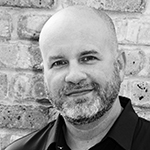Finding a Future Amid Fright
John Renaldi shares unique anecdotes in his mpd² courses from his life as a startup founder and tech executive, including the heart-stopping 30 minutes that changed his life.
For 30 terrifying minutes, John Renaldi couldn’t find his 6-year-old son amidst the thousands of visitors exploring Chicago’s Maggie Daley Park.
The two eventually reunited, and in Renaldi's fear, he also found inspiration. The traumatic experience led him to co-found Jiobit, a company that produced the world’s smallest and longest-lasting location monitor for kids.
 Six years later, Life360 acquired the company.
Six years later, Life360 acquired the company.
Renaldi moved on to Google, where he spent two years as head of product and design for Wear OS. While there, though, he felt a different desire calling. He wanted to teach, and he wanted to mentor.
He now does both through Northwestern Engineering's Master of Product Design and Development Management (mpd²) program. Renaldi co-leads the program's Capstone course and also teaches Management of Product Innovation.
“Once we had a nice exit from the sale of the business, I could start to spend more time doing things that fill up my tank of energy,” Renaldi said. “Google was a great way to put a nice end cap on my corporate career.”
That corporate career included a stint at Motorola from 2004-15. There, he served as vice president of product management. It’s also where he worked with Jim Wicks, director of the mpd² program and former Motorola Google Design vice president.
“When Jim left Motorola to start at Northwestern, I helped him out by guest lecturing in his classes,” Renaldi said. “I think he saw firsthand how I worked essentially as a general manager and was able to drive all the various disciplines. I think he realized there was a lot of crossover with mpd² that I could help with.”
That crossover now includes the program's culminating capstone activity. Renaldi leans heavily on his corporate experience to provide students with industry examples about product design and development.
Because his career wound its way from startups to corporate behemoths, he is able to incorporate a wide array of relevant case studies into class.
“These students come from a variety of backgrounds,” he said. “They may not all go into startups, but at the same time, many of these lessons are very durable, whether they go into a larger company or smaller company.”
He also isn’t afraid to look at the uglier parts of his career. Renaldi provides real-life examples of his personal corporate failures as part of class.
“Oftentimes those failure stories are more interesting,” he said. “They sit with students more than the successes I had.”
Those personal experiences also find their way into Management of Product Innovation. In that class, Renaldi's goal is to help students learn to manage success in a way that leaves time to innovate.
The enemy of innovation is often that very success, he said, because it robs time once dedicated to thinking about what comes next.
“It becomes incredibly difficult to disrupt yourself and plan that second or third horizon of the future of your business,” he said. “What we try to do is equip students with tools and frameworks for how to bring more balance.”
That balance includes how to successfully integrate an innovations team with those responsible for keeping existing products and services rolling. It’s a challenging mission many companies fail to accomplish, Renaldi said.
Free from his former corporate responsibilities and with his family safe, Renaldi is enthused to dedicate more time and energy to mpd². Already he is impressed with the caliber of students who come through the program.
“mpd² students are thirsty for the experience and the instruction. They absorb everything like sponges,” he said. “Their primary goal is to learn, not just to check a box for their resume.”
